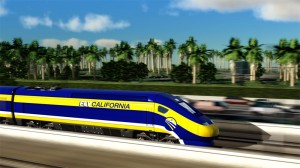 The Dallas to Houston route looks like it may be on-line faster than California’s Madera to somewhere-near-Bakersfield segment, per Jeff Turrentine at NRDC:
The Dallas to Houston route looks like it may be on-line faster than California’s Madera to somewhere-near-Bakersfield segment, per Jeff Turrentine at NRDC:
Now, nearly 50 years after its founding, Southwest may soon face unexpected competition for its always-booked Dallas-to-Houston service. And in a telling bit of irony, this new rival has come in the form of a railway company, of all things.
After several years spent getting its legal, financial, and procedural ducks in a row, the company known as Texas Central is moving ever closer to realizing its goal of linking two of Texas’s biggest cities via high-speed bullet train. Though a few right-of-way issues still need to be cleared up, Texas Central seems on track (I know, I know; I’m sorry) to break ground on its 240-mile-long rail system in early 2017, with service scheduled to begin within the next five years. Then the nearly 50,000 Texans whom the company has identified as Dallas-to-Houston “supercommuters”—i.e., those who drive or fly between the two cities more than once a week—will have a highly attractive third option: climbing aboard sleek, swift, tricked-out trains that depart every half-hour and reach their center-city destinations in under 90 minutes.
So what’s the secret sauce that enables Texas to get moving while California plods along, aiming to finish sometime in the 2030s? Well, I’m sure it’s cheaper and easier to build in a place like Texas, with fewer environmental restrictions and a flat terrain (no Tehachapis to deal with).
But perhaps more importantly, the rail system would connect two major cities on a straight line, covering a distance that’s a bit too far to drive and pretty close to fly. In other words, it’s the sweet spot for high speed rail. And with that fast connection, private money is flowing.
Contrast that approach with California, which is zigzagging its train from Los Angeles to San Francisco in order to satisfy various political constituencies. The result is less private sector appetite to invest and a rail connection that requires significant public support and a long time horizon to build.
I’m certainly rooting for California to build high speed rail, but red state Texas may just beat California to the punch.


